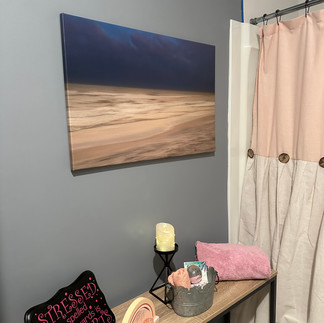The Myth of “No Time for Self-Care”: And what to do about it
- Tami West, PhD

- Mar 6, 2024
- 6 min read
Welcome back to Consider Yourself Hugged! Click here to listen to Episode 158. OR click YouTube below to watch! (***Disclaimer: I provide these notes as a skeleton for the show - nothing fancy 😄)
Welcome in! Part I will cover why it’s a myth and Part II, how to better take care of yourself.
This all started with a “remodel” of my guest bathroom. Here are some pictures, and click here to listen to the whole I hurt myself AGAIN story 😁
Let’s get this out-of-the-way: if you have a new baby, a new job, you’re in school, a single parent, taking care of an elderly parent, etc. your time is definitely more limited!
Today we'll do a couple of things: First, we'll talk about how Americans are using their time. Then I'll share 3 different approaches to why we often say we don't have enough time for self-care: 1) AI-generated, 2) APA Article (link at end of show notes), 3)Tami's take 😁
Let's take a look at how Americans are using their time?:
From American Time Use Survey Summary: Leisure and Sports Activities in 2022
--On an average day, nearly everyone age 15 and over (95 percent) engaged in some sort
of leisure and sport activity, such as watching TV, socializing, or exercising. Men
spent more time in these activities than did women (5.6 hours, compared with 4.8 hours).
(See table 1.)
--On average, adults age 75 and over spent 7.5 hours engaged in leisure and sports
activities per day--more than any other age group; those ages 25 to 54 averaged 4.2
hours doing leisure and sports activities per day--less than other age groups.
(See table 11A.)
--Watching TV was the leisure and sports activity that occupied the most time
(2.8 hours per day), accounting for over half of all leisure time, on average.
(See table 11A.)
--Playing games and computer use for leisure, and socializing and communicating were the
next most common leisure and sports activities after watching TV. On an average day,
individuals spent 34 minutes playing games and using a computer for leisure and 34
minutes socializing and communicating. They spent twice as much time socializing on
weekend days (53 minutes) as on weekdays (25 minutes). (See tables 11A and 11B.)
--Time spent reading for personal interest and playing games or using a computer for
leisure varied greatly by age. On an average day, individuals age 75 and over spent
40 minutes reading while those ages 15 to 19 read for 13 minutes. Conversely,
individuals age 15 to 19 spent 1 hour and 38 minutes playing games or using a
computer on an average day, while those ages 75 and older spent 29 minutes doing so.
(See table 11A.)
--Employed adults living in households with no children under age 18 engaged in leisure
and sports activities for 4.6 hours per day, over an hour more than did employed adults
living with a child under age 6 (3.4 hours). (See table 8B.)
Now let's look at those different approaches to why we often say we don't have enough time for self-care: 1) AI-generated, 2) APA Article (link at end of show notes), 3)Tami's take 😁
AI-Generated Reasons:
The most common reasons people say they don't have enough time to take care of themselves often revolve around the following:
1. Work commitments: Many individuals report long hours or demanding jobs that leave them with little energy or time for self-care.
2. Family responsibilities: Parents, especially those with young children or those caring for elderly family members, often prioritize the needs of their family members over their own.
3. Social obligations: Keeping up with social engagements or community responsibilities can consume time that might otherwise be used for self-care.
4. Financial stress: The pressure to meet financial obligations can lead to working multiple jobs or extended hours, reducing the available time for personal care.
5. Lack of prioritization: Some people do not prioritize self-care, seeing it as less important than other responsibilities or even as a luxury.
6. Perceived selfishness: There's a common belief among some that taking time for oneself is selfish, especially when others depend on them.
7. Overwhelming daily tasks: The accumulation of everyday tasks, like housework, errands, and managing personal affairs, can leave little room for self-care.
8. Digital distractions: Excessive time spent on electronic devices for entertainment or communication can inadvertently consume time that could be used for self-care activities.
9. Lack of awareness: Some individuals may not recognize the importance of self-care or know how to incorporate it into their lives effectively.
10. Mental health issues: Conditions like depression and anxiety can make it hard for individuals to motivate themselves to engage in self-care practices.
APA Article: Here are five hidden beliefs that undermine good self-care:
1. It is selfish to care for myself. We imagine a perfect person being one who is completely selfless, flowing with boundless love and compassion for others. Because of this belief, self-care leads to feelings of guilt.
2. Strong people sacrifice their needs to meet the needs of others. We imagine that if we are courageous enough, we can ignore our own needs and sacrificially meet the needs of others.
3. I don’t deserve self-care because I have not earned it. We believe life gives us what we deserve, and we must earn anything good that comes into our life. We struggle to see ourselves as good enough to earn the right to enjoy self-care. We could have done more or been better.
4. I don’t have time to focus on myself. We believe that self-care is time-consuming rather than something that happens on a moment-to-moment basis. We tend to ignore the reality that we are quite good at wasting time on ourselves when we are watching TV or engaged in other mindless, non-refreshing activities.
5. I am controlled by my circumstances. We tend to have an external locus of control rather than an internal locus of control mindset. We do not see ourselves as in charge of our responses and capable of making choices regardless of the situation we are in. The challenges we face seem to be something that makes us miserable and our stress response and poor coping inevitable.
Tami's Takes:

1. Falling prey to societal messages.
2. Unknown social media pressure.
3. If you do take time, you will give up your identity.
4. Believing overwork leads to love & respect.
Links:
*Disclaimer:
The information in this show is not intended to be therapy or to address your individual situation. It is information based on my experiences, opinions, and research. If you need further help, please reach out to one of the resources here:
Mental Health Resources:
Thanks for joining today! As we’ve always asked in the past, please pass the show link along to your friends and subscribe, download, and review wherever you are listening. If you’re a woman and you haven’t joined our private FB group A Place for Women, please do that now! It’ll be your source of encouragement. I'd love for you to follow my Tami West Seminars Facebook page as well. And until next time, Consider Yourself Hugged 😘🤗

Tami West, PhD
Stress and Mental Health Expert Dr. Tami West uses her entertaining and compelling style to shine a new light on how to transform your life and discover solutions to life’s challenges.
Tami has worked in a variety of industries including healthcare, school nutrition, corporate sales, and 10 years as a public-school teacher. In 2013 she received her PhD in Human Development, studying the connections among stress, emotions, and identity.
Dr. West has spoken in 48 states across the US, as well as the United Kingdom, Australia, and New Zealand. In any given year, Tami speaks to groups with audiences consisting of anywhere from 100 to 3,000 people.
Dr. West is the author of several successful publications including three books: The Stress Club, Life Without the Monsters and Thrive. When she's not speaking or writing, you might find her with her traveling with her husband and family, reading historical fiction, or watching Big Bang Theory.
Tami connects with audiences through real experience, cutting edge research, and transparent stories – all sprinkled with humor! She will make you laugh, cry, and shine a refreshingly new light on life's challenges.
Television Interviews
Contact Tami at tamiwest@tamiwest.com or follow her at Tami West Seminars.
















Comments